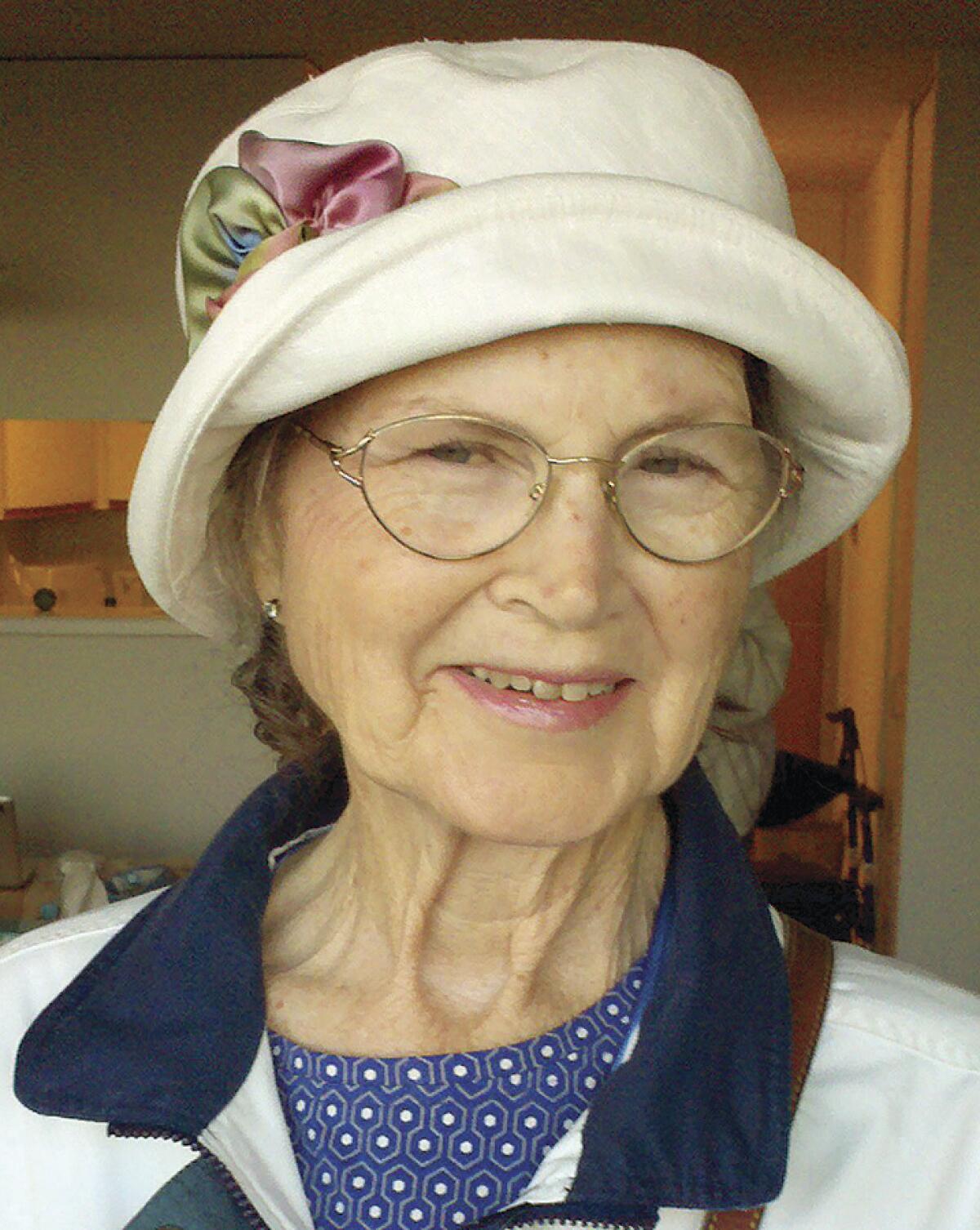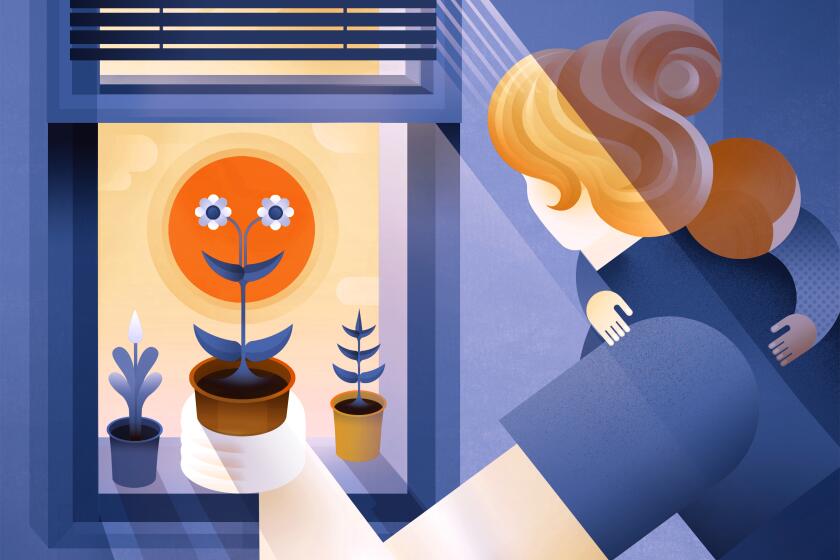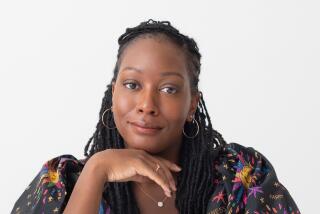Years after my mother’s death, I finally understand what she was trying to say

- Share via
I come from a long line of stubborn women who never fit in, so maybe that’s why I’m not a fan of Mother’s Day.
I have the cred to complain: I’m a mom; a proud mom. I still have the first “beautiful rock” (of thousands) my eldest son handed me when he was only 3 — toasty-warm from him holding it all day — so, yes, I’m a super sentimental mom. A no-job-has-ever-been-or-could-ever-be-better mom.
But this is not a bitter tirade about my adult children, let me be clear: Of course they could call more. Of course they could visit more often. How I wish they would finally get me that garden caddy I’ve always hinted at (just $99 online!).
I think I’ve peeled things back to the real reason for this rant: I hate Mother’s Day because it reminds me too much of my failings as a daughter.
My mom, Edna Marantos, died in 2011, at 80. I miss her and regret all our missed opportunities to connect.
Which is not to say we didn’t talk. She called or I called many times a week, especially after my boys were born. We talked about any number of things, but after a while I got impatient and dismissive. My mother was never very direct. She could circle a topic for hours before getting to the point.
Once she called me in the middle of the workday. I was a little alarmed, but I listened as she chatted for 10 minutes about this and that until I blurted out, “Mom, I’m working. Why did you call?”
“Why do you have to be so blunt?” she said and then told me that a woman I barely remembered had died, an old family friend I hadn’t seen since childhood. We talked for a short time more, but I checked out almost immediately after that, my mind already back to work.
What I realize now is that my mom called to share this news not for me but for her. “I thought you’d want to know,” she said, but really, my mom was looking for comfort from someone who didn’t understand her language at all. Years later, when I reflect on this call, I recall that my mom and this woman had once been close but had lost touch over time. My mom was feeling guilty she wasn’t there for her friend, and she was frightened too. She was calling me because she wanted some comfort.
But she didn’t — couldn’t — say any of these things, and of course I was too busy to pick up the clues. I was always very busy.
My mom was a homemaker. I was trying to balance my ambition as a reporter with being a good mom, and occasionally even a good wife, while keeping my family financially afloat. She was always telling me to slow down. Slowing down was not an option.
I am the mother of a 20-month-old with a terminal disease.
Ironically, my mom knew plenty about hardscrabble, but she kept the details pretty private. She didn’t want to trouble her kids with a life she worked hard to ensure we wouldn’t understand.
She left home when she was 13 to escape an abusive stepfather and a mother who couldn’t — or wouldn’t — protect her. She and her 10-year-old brother ran away together, down a long country road in Oklahoma, and parted at the crossing.
They were looking for help from their late father’s family. My mother was 7 when her father died, a 27-year-old coal miner destroyed by black lung disease. The company gave his widow some compensation for his death, and she met a man who helped her squander it, then hurt her and her children after the money was gone.
Standing on that road, my mother and her brother were just children, but they knew times were hard and that none of their uncles or aunts could afford to house them both. So he went one way at the crossing, to their uncle’s home, and she went another, to their aunt, many miles away. They didn’t see each other again for years, because the family she chose would head west, to California.
She never went back to school; her aunt and uncle took her in, but they had other children and a threadbare farm, so my mom had to earn her keep. She moved with them to Bakersfield and got work right away, picking cotton and grapes.
Her mother, in the meantime, was having more children and wanted my mother back to help. Finally, her mother threatened to call the police to get her daughter back, so my mother’s aunt and uncle reluctantly drove her halfway across the country, from a tidy little farmhouse to a sagging shack in a weedy field.
My mom never told us this story; I heard it only after she died.
My mother’s stepfather was a junk man, and they lived in squalor, my great-aunt said, in a shotgun house full of flies because the windows had no screens. My great-aunt remembers watching my mother unpack her little suitcase, with her clean and carefully folded clothes, and then said goodbye.
My great-aunt and uncle then drove to a nearby relative’s house that night, but neither of them slept, and the next morning they drove back and just took my mother away, saying they didn’t care what the police did.
My grandmother never called the police. My mom returned to Bakersfield, and when she was 17 she got a job making doughnuts at a restaurant. That’s where my father found her, on his daily walks to the bank. Their 57-year marriage was a gift to them both; their four children were just icing on the cake.
All this time at home has a side effect: A chance to learn more about ourselves and the people we’re with. Here’s how to have your a-ha moment.
My mom’s been dead nearly a decade now, after fighting cancer for nearly as long, but I think of her so often these days. I have so many questions I want to ask her. What was that night like in the little shotgun house? Was she glad to see her mom and half siblings? Did they have a chance to talk and reunite? Or did she sleep in anguish, plotting her next escape?
I’ll never know, because it wasn’t a story she ever told. She didn’t want us to know about the hardships in her life, and she tried to soften my feelings toward her mom. I judged my grandmother pretty harshly, but she knew plenty about hardship too. She was married three times before she was 30 and had her first child at 13. Her first two husbands were miners, one killed in an explosion, the other by dust that smothered his lungs. Her final husband was hit by a train, leaving her widowed again with a broken trailer home and six children. She refused to marry again after that.
“We have to forgive people,” my mother said, when I was critical of my grandmother. And I know my mom tried for connection with her mom too, even though their lives were as different as could be.

I think about this often now, when I need my mom more than ever. I think I’ve reached the age — or awareness — at which we could finally have some good conversations ... no, where I could finally listen and hear what she was trying to say.
I know parent-child relationships are fraught. Maybe I’m just kidding myself about finally having good talks with my mom, but I sure wish I could try; Mother’s Day or no, I’d give anything if I could try.
Because all those years ago, when she said, “I wish you could slow down,” what she was really trying to say was, “I wish you would slow down and talk to me.”
More to Read
Sign up for The Wild
We’ll help you find the best places to hike, bike and run, as well as the perfect silent spots for meditation and yoga.
You may occasionally receive promotional content from the Los Angeles Times.













